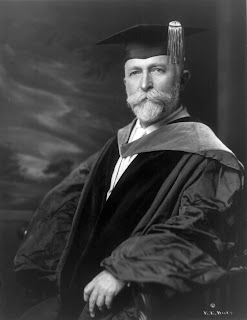I touched upon this obliquely when I claimed one ought never put two Sherlocks in the same room wherein I deprecated the practice of baffling the reader with a bunch of inside-baseball expert blather. And I've touched upon this obliquely when I noted that Science Fiction has a distinct expression that favors invention and science over sociology and culture. I'm more a fan of the Jules Verne expression over the H. G. Wells expression.
The writer may know things other than writing. For instance, Erle Stanley Gardner was a practicing lawyer before Perry Mason argued his first murder case. Police procedural stories are often written by former cops or forensic pathologists. Military Science Fiction stories are often penned by former military people. In each of these cases, the writer can truly say to the reader, "I know something you don't."
This enables the writer to do two things: 1) He can lend details from his experience. Mr. Gardner was able to use his own courtroom experience to insert small details that lend verisimilitude to his narrative. 2) He can explain how something works. If you want to see world-class explaining, pick up a Neal Stephenson book. You won't need a forklift. You just think you will. I'm interested in the explaining thing today.
Experts love to be true to their craft, and this makes them think, "I cannot dumb this down." They say this to justify writing that proves opaque to the ordinary reader. If you refuse to dumb something down, you're the dummy.
I was in the middle of my Masters' degree studies in Mathematics at Michigan State University when a visiting scholar came by to give a colloquium. He gave a talk on a topic of mathematics that was very difficult for me, and I knew I did not understand it going in. So, I was a little scared at the beginning of the talk. I needn't have been. The guy made the topic seem a lot easier than it really was. He knew multiple motivating examples for the key ideas and he knew which ideas were the more important ones.
I realized that this was the smartest guy I'd run into at MSU. It takes genius to make some things look easy.
C. S. Lewis famously said that if you cannot explain something to the woman who does your washing, you really don't understand it.
Understanding is like cutting a path through the tangled undergrowth of your ignorance. When I first learn something, I blaze one trail through this jungle and it twists about a lot. But when I learn a thing better, I have more than one way to get to the same point. All knowledge is interconnected somehow and the more you know, the more interconnects you possess.
Also, when I barely understand a thing, I don't know what's important and what's insignificant. Pretty much everything has to be held onto for dear life lest it be needed later. It's a lot less work when you know what the essential issues are and can dispense with the rest.
Suppose you're writing an explanation for something--like how a radio antenna works. You have to decide which parts of the explanation are pertinent or not. And then you can devise analogies that motivate the key ideas. An antenna element is not exactly like a tuning fork. It uses vibrating electrons to induce electromagnetic radiation whereas a tuning fork uses vibrating tines to induce sound. However, the process is essentially the same even if the details vary.
Cool facts about the partial differential equations governing the behavior of the radio waves can be left out of some explanation, because they are not pertinent to the story. Sure, you'll need to know them if you ever build an antenna, but not when you write for a popular audience. The expert is an expert because s/he knows what can be safely left out.
The expert is also an expert because s/he knows the connections between this thing and other things. Your audience may not know anything about short wave radio, but they do know something about other things, like snakes. Those other things they know about should be what you use to approach the subject.
I spoke of this obliquely before, but I'll say it directly here. The writer should make the reader feel empowered and good, not intimidated and bad. Maybe the reader lacks the time and the inclination to take a degree in radio engineering and/or pursue FCC licensing. But s/he can get a taste of the coolness of the work. The writer must be sensitive of and compassionate toward the reader to make the prose understandable and enjoyable.






No comments:
Post a Comment